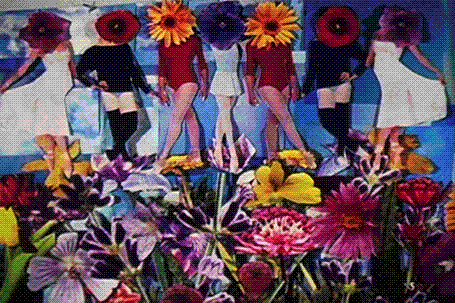▲ ▲ ▲▲ ▲ ▲ ▲
For the second time, the NYU Orphan Film Symposium has conferred its Helen Hill Award on two filmmakers whose work embodies Helen's independent spirit and artistic legacy: Danielle Ash and Jodie Mack.
Danielle Ash is a Brooklyn-based media artist who received an MFA in Experimental Animation from CalArts (2008) and a BFA from the School of the Art Institute of Chicago (1999). She has worked extensively as a producer, editor, title designer, and animator, while pursuing her individual work. Visiting her web site (www.DanielleAsh.com) you can read about and see samples of her films, which include a dozen animated shorts.
Maureen Furniss, CalArts professor of animation and founder of Animation Journal, writes:
Danielle Ash's films take a delightful, hand-made approach to celebrating life's everyday moments -- the dance of pigeons, the blossoming of love, and the sights and sounds that define the spaces we live in.
Danielle is a gifted artist who brings together skills as a designer, musician, performer, and technical innovator -- blending them with a handcrafted aesthetic that is truly original.
Her work includes performances and installations using toys, puppets, and automata.
She also plays the musical saw.
▲ ▲ ▲▲ ▲ ▲▲
Jodie Mack received her MFA in Film, Video, and New Media from the School of the Art Institute of Chicago. Her recent work includes the animated musical, Yard Work Is Hard Work (2008) and Twilight Spirit (2009), a music video for Judson Claiborne. She teaches at DePaul University, the University of Illinois Chicago, and the Art Institute's Early College Program, as well as the California State Summer School for the Arts (where Helen once taught and where, Jodie reports, she coincidentally stays in Helen's old dorm room).
Jodie studied at the University of Florida, where Roger Beebe was one of her professors. He writes:
Jodie Mack’s amazing energy was totally transformative, in both my classroom and our community. The first year of FLEX (the Florida Experimental Film/Video Festival) was possible largely thanks to her tireless efforts.
I can also see, in those first exercises she did as a student, the germs of the incredible work she's done since. Helen Hill’s film “cookbooklet” Recipes for Disaster was a huge inspiration for her (as for many students who pass through my classroom). More than any student I've ever seen, Jodie is adding new pages to that wonderful resource Helen compiled. Jodie's films come from a marvelous, idiosyncratic world full of bright colors, perpetually renewed handcrafted technique, and endless wordplay and song.Sample more Mack at vimeo.com/jodiemack.
She is also "starting a choir to perform with abstract animations."
Mack & Ash will both present films at the Orphan Film Symposium, April 7-10, 2010, in New York.
▲ ▲ ▲▲ ▲ ▲ ▲ ▲ ▲▲ ▲ ▲▲ ▲ ▲
Thanks to Susan Courtney and Laura Kissel (University of South Carolina) for jurying the Helen Hill Award, and to Larry Hembree (the Nickelodeon Theatre in Columbia), for watching over the award funds. As ever, we extend our gratitude to Helen's family -- Paul, Poppy, Becky, Kevin, and Jake -- for letting "Orphans" be affiliated with the loving legacy of Helen Wingard Hill.






